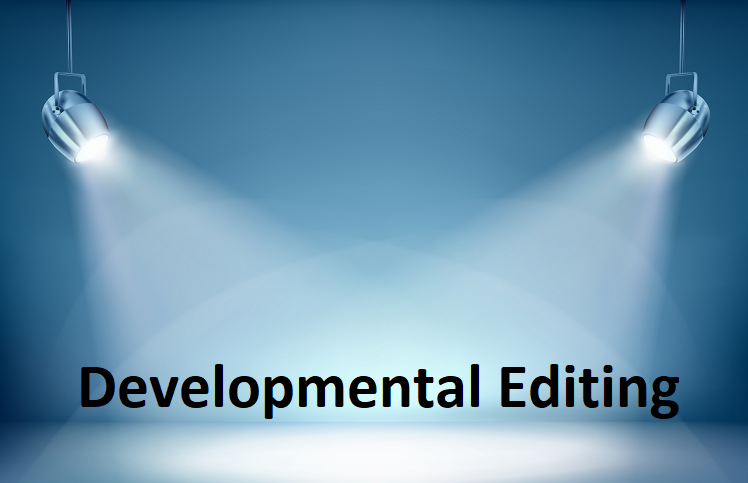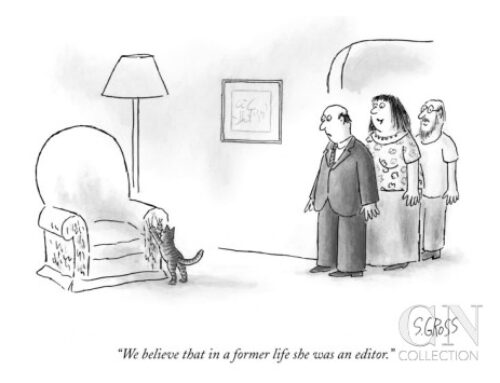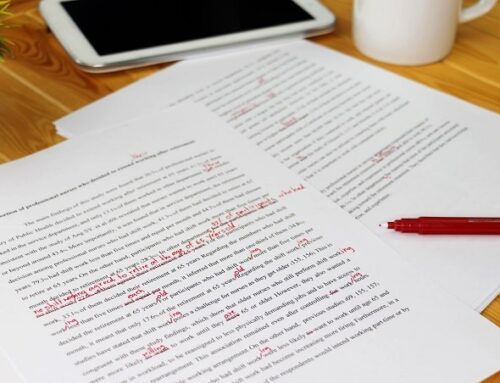When many people think of editing, they think of arcane symbols and scribbled margin notes in red or blue pencil – move this paragraph, delete these words, add a hyphen, correct that spelling, capitalize this letter. And while that is an important part of editing, it’s only one part, and it comes last. So let’s talk about what comes first: developmental editing.
If you’re like many of us in the writing world, you wrote the first draft of your manuscript and then revised it, revised it some more, asked some friends and loved ones to read it, revised it yet again, and eventually decided it was ready to go out in the world.
Your particular journey may have included more/fewer revisions or more/less feedback, but the process is essentially the same for all of us: write → revise → get feedback → repeat, until you think you’re done.
It’s the “done” part that’s tricky. What does it mean? Is it when you’ve pushed yourself as far as you can go? (Is that far enough?) Is it when the manuscript couldn’t possibly be improved upon by mortal man? (How do you know?) Is it when your wife tells you it’s the best thing she’s ever read? (Is she objective?) Is it when you simply can’t stand to look at the accursed thing for another minute? (Understandable, but not exactly a ringing endorsement.)
You see the problem. We’re all too close to our own work to really know when it’s ready to be released into the world, and our friends and family are too close to us to know, so this is where professional editors come in.
Wait…Doesn’t someone else handle this?
I can hear some people asking so yes, in the good old days agents and publishers used to serve the function of a developmental editor and would work with an author to further hone a story that wasn’t quite ready for prime time, if they thought the story had sufficient promise. These days, though, agents and publishers expect a manuscript to be ready for market, and even agents will tell you to hire a reputable editor.
In addition, the advent of affordable, high-quality self-publishing has created a whole new need for developmental editing, because as authors cut gatekeepers out of the loop altogether and connect directly with their readers, someone still needs to bring an objective eye to the process.
We support both paths to publication, and regardless of your goals for your book, we want you to have the best possible shot at success. That means not going to market until you have a piece of writing that is absolutely as good as you can make it.
What Developmental Editing Is (And Isn’t)
Editing, at least as we define it, has three phases: development (or developmental editing), line editing, and final correction. We’ll talk about the other two down the road, but for now let’s focus on development.
Developmental editing can happen in lots of ways–it can take the shape of informal feedback and discussion by phone or email, a lengthy editorial memo, running editorial commentary in a manuscript, or any combination of the above. But its intent is always the same: to guide an author through the manuscript revision process and provide actionable feedback, ideas, lessons and suggestions to make your manuscript better.
In short, developmental editing is feedback from an editor on where a manuscript currently stands with relation to where it needs to go, along with suggestions for how to get from here to there, step by step.
With fiction, developmental editing addresses such elements as structure, pacing, proportion, dialogue, character, plot, storytelling, style, and marketability – anything that affects a manuscript’s ability to provide an engaging experience for the reader. Particular genres have their own requirements and the editor will address those too, but at heart all stories need to work as stories above all.
With nonfiction, developmental editing focuses on structure, organization, clarity, logic, and effectiveness. What that means for any one manuscript or book proposal varies tremendously, since nonfiction encompasses everything from memoir to textbooks, but all developmental feedback is again geared toward creating the most engaging reading experience for the intended audience, whether that audience is made up of a few people or millions.
Developmental feedback may contain some hands-on editing to illustrate principles of craft and mechanics, but in general it’s not about the editor making changes. The focus is on providing guidance and coaching to authors, so they can not only make the changes on their own, but grow and improve as writers.
Memoir
Memoir can be tricky because it can encompass anything from an ardent exposé to a quiet reflection, and it can be marketed on the strength of its author, story, message, writing, accuracy, or topic. In many ways memoir has its feet in both the fiction and nonfiction worlds – it can be pitched by proposal like nonfiction, or by manuscript like fiction – so it’s important to understand which approach best fits each individual project.
When developing memoirs, look for an editor who not only enjoys working on them but also reading them; they’ll understand the peculiar needs of the genre, and be able to better help you take advantage of your strengths. That way you can focus the manuscript to meet the needs of the right readership.
How Developmental Editing Works At The Editorial Department
Remember the “write, revise, get feedback, repeat” stuff from the first paragraph? Developmental editing takes that concept to the professional level.
In other words, it’s iterative, and it’s not for the dilettante or the faint of heart. It’s not a single event, where you can expect to get feedback telling you every single thing that needs to be addressed so you can fix it and move on. Developing a manuscript isn’t like repairing a refrigerator. Manuscripts are living, breathing organisms, and making a change over here often creates the need for a change over there. It’s also a process that teaches you as you go through it, leading to epiphanies that give you better and better ideas that then affect other areas of the manuscript. The developmental editor is your sounding board, on hand to tell you if all the wonderful, creative, passionate, important stuff you want to communicate is coming through as you intend – and when it isn’t, to help you figure out why not and what you can do about it.
How many rounds of write-revise-feedback a manuscript may go through before it’s ready for the next phase can depend on many factors, including how well editor and author understand each other, the author’s skill level, the editor’s ability to make clear and concrete suggestions, the author’s goals, the manuscript’s intended audience, and the author’s level of perfectionism (especially in relation to the author’s budget).
At The Editorial Department we believe in pushing authors as hard as they’re willing to be pushed at the development phase, because we know how much competition you’re up against no matter what you’re writing or how you plan to publish, and we want you to succeed. We’ll always tell you what we think your best next step should be.
But we also understand that everyone has limits – limits to their abilities, limits to their patience, their budget, their time, and their energy. We won’t tie you into long-term contracts or strong-arm you to spend money. None of us think in terms of sales, and we’re not in this business to get rich. We’re in it because we love it – we love words and books and ideas and imagination and communication and all the ways humans reach out to each other – and we’re in it because we’re good at it. We want to know what your goals are, why you are writing, and what you get out of it.
And we want you to succeed.
The Editorial Department has experienced editors on staff who specialize in developmental editing for commercial, literary, and mainstream fiction and many categories of nonfiction. For questions and submissions please contact Ross Browne at the Tucson office.






